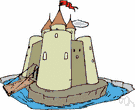moat
Also found in: Thesaurus, Acronyms, Encyclopedia, Wikipedia.
Related to moat: Economic Moat
moat
(mōt)n.
1. A deep wide ditch, usually filled with water, typically surrounding a fortified medieval town, fortress, or castle as a protection against assault.
2. A ditch similar to one surrounding a fortification: A moat separates the animals in the zoo from the spectators.
tr.v. moat·ed, moat·ing, moats
To surround with or as if with a moat.
[Middle English mote, mound, moat (since both mounds and moats form part of fortifications), from Old French, mound; akin to Medieval Latin mota, perhaps of Germanic origin and akin to English mud.]
American Heritage® Dictionary of the English Language, Fifth Edition. Copyright © 2016 by Houghton Mifflin Harcourt Publishing Company. Published by Houghton Mifflin Harcourt Publishing Company. All rights reserved.
moat
(məʊt)n
(Fortifications) a wide water-filled ditch surrounding a fortified place, such as a castle
vb
(Fortifications) (tr) to surround with or as if with a moat
[C14: from Old French motte mound]
Collins English Dictionary – Complete and Unabridged, 12th Edition 2014 © HarperCollins Publishers 1991, 1994, 1998, 2000, 2003, 2006, 2007, 2009, 2011, 2014
moat
(moʊt)n.
1. a deep, wide trench, usu. filled with water, surrounding the rampart of a fortified place, as a town or a castle.
2. any similar trench, as one used for confining animals in a zoo.
[1325–75; Middle English mote mound, hill, ditch, moat < Old French, c. Old Provençal mota < pre-Latin *mutta]
Random House Kernerman Webster's College Dictionary, © 2010 K Dictionaries Ltd. Copyright 2005, 1997, 1991 by Random House, Inc. All rights reserved.
moat
- From French mote/motte, meaning "mound."See also related terms for mound.
Farlex Trivia Dictionary. © 2012 Farlex, Inc. All rights reserved.
moat
Past participle: moated
Gerund: moating
| Imperative |
|---|
| moat |
| moat |
Collins English Verb Tables © HarperCollins Publishers 2011
ThesaurusAntonymsRelated WordsSynonymsLegend:
Switch to new thesaurus
| Noun | 1. |  moat - ditch dug as a fortification and usually filled with water moat - ditch dug as a fortification and usually filled with watertrench - a ditch dug as a fortification having a parapet of the excavated earth |
Based on WordNet 3.0, Farlex clipart collection. © 2003-2012 Princeton University, Farlex Inc.
Translations
خَنْدَقٌ مَائِيٌّخَنْدَق مَمْلوء بِالماء
hradní příkoppříkopvodní příkop
voldgrav
vallihauta
jarak
várárok
virkisgröf, kastaladíki
濠
호
gynybinis griovys
aizsarggrāvisgrāvis
grachtslotgracht
vallgrav
คูน้ำรอบปราสาทหรือเมือง
hendekkale hendeği
hào
Collins Spanish Dictionary - Complete and Unabridged 8th Edition 2005 © William Collins Sons & Co. Ltd. 1971, 1988 © HarperCollins Publishers 1992, 1993, 1996, 1997, 2000, 2003, 2005
Collins English/French Electronic Resource. © HarperCollins Publishers 2005
moat
n → Wassergraben m; (of castle also) → Burggraben m
Collins German Dictionary – Complete and Unabridged 7th Edition 2005. © William Collins Sons & Co. Ltd. 1980 © HarperCollins Publishers 1991, 1997, 1999, 2004, 2005, 2007
Collins Italian Dictionary 1st Edition © HarperCollins Publishers 1995
moat
(məut) noun a deep ditch, dug round a castle etc, usually filled with water.
Kernerman English Multilingual Dictionary © 2006-2013 K Dictionaries Ltd.
moat
→ خَنْدَقٌ مَائِيٌّ hradní příkop voldgrav Wassergraben τάφρος φρουρίου foso vallihauta douves jarak fosso 濠 호 gracht vollgrav fosa fosso крепостной ров vallgrav คูน้ำรอบปราสาทหรือเมือง hendek hào 护城河Multilingual Translator © HarperCollins Publishers 2009